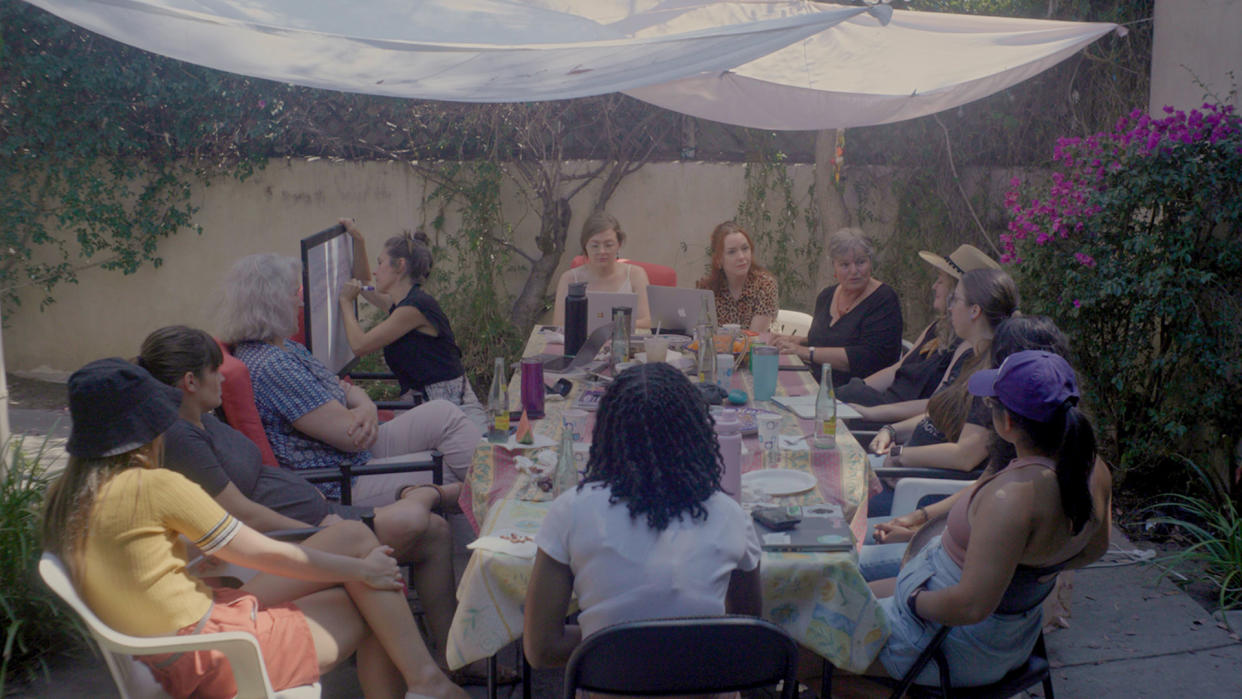‘Plan C’ Review: Tracy Dros Tragos Embeds with Abortion Ambassadors During (Another) Fraught Time in History

Francine Coeytaux and Elisa Wells have been at this for awhile. In the ’90s, the pair were part of the team that helped bring Plan B, AKA the “morning-after pill,” over the counter to anyone who needed it. Even after the initial Roe v. Wade ruling in 1973 — which made abortion a protected right in the United States — the pro-life versus pro-choice fault lines remained in America and extended even to medically safe (and legal) oral contraceptives and abortion medications. (While America still debates the legality and morality of various forms of contraceptive and medication, Plan B been legal in 90 other countries for many years.)
But that was Plan B. These days, it’s all about Plan C. Founded in 2015 and led by Coeytaux, Wells, and Amy Merrill, the organization was designed with one pressing mission: to envision and help establish “a near future in which the ability to end an early pregnancy is directly in the hands of anyone who seeks it.” Easier said than done.
More from IndieWire
Ridley Scott Says He Took Issue with the Way 'Joker' 'Celebrated Violence'
'The Exorcist: Believer,' but Audiences Aren't as Reboot Opens to $45 Million Worldwide
For “Plan C,” filmmaker Tracy Droz Tragos embeds with the team during another fraught period in America. While the Plan C team has been working steadily (and stealthily) since 2015, they’ve seen their functions and abilities rapidly change, moving from simply providing information about how to get abortion medication to helping run what one winkingly calls a “drug cartel” to get necessary healthcare to some of society’s most vulnerable citizens.
Despite the understandably emotional and deeply personal nature of Plan C’s work, Tragos’ film remains startlingly clear-eyed and concise, letting the stories she shares from abortion organizers, healthcare ambassadors, doctors, clinic workers, and patients speak for themselves.
They’ve got plenty to say, most of it bolstered by Coeytaux’s vast knowledge and her deep-seated beliefs. Abortion medication “should be an option available” to those who need it, just like any other form of contraception or healthcare, Coeytaux tells us.
Tragos is no stranger to abortion stories. She previously made the HBO doc “Abortion: Stories Women Tell” and sought to make another film about the continued battles to allow such procedures and medication to remain safe and legal after the Brett Kavanaugh was appointed to the Supreme Court. Tragos, along with others in this space (and anyone who paid attention to the machinations of the people and powers who controlled the court in 2018), realized that the Roe decision was on the chopping block, but no one could have predicted just how quickly abortion care would be rolled back. Enter: the COVID-19 pandemic.
Far too much happened during the early days of the pandemic, but one major change immediately impacted all aspects of abortion care. During the early days of the COVID lockdown, public health policy recommended and/or ordered people to refrain from visiting hospitals and healthcare centers, except when in need of essential services — which, in a number of states, pointedly did not include abortion procedures. Suddenly, the people Plan C attempted to help needed much more — they needed abortion medication, which underground members of the group soon started providing via mail.
If that sounds dangerous, you don’t know the half of it. Tragos uses her to-the-point style to let Coeytaux and company (some of whom show their faces and names; many opt to remain anonymous for safety and legal reasons) walk us through the process and its many potential outcomes. The film covers an incredible amount of history and knowledge (a particularly insightful segment features Loretta J. Ross, who serves as our conduit into Black women’s work within the space; she deserves her own documentary ASAP), illuminating a history that continues to grow and change.
Tragos doesn’t shy from showing the most basic side of this crusade: women (and it’s mostly women; we generally only see men hanging around outside clinics and marching at demonstrations in hopes of harassing terrified patients) doing the work to ensure safe options for those who need health care. The Plan C crew carries on under constant threat and fear as they chug their way around the country meeting people who need medication, stashing information in the most unlikely spaces, and participating in marches and demonstrations to get the word out. They want those who need their help to not feel alone, and that means showing up over and over.
Late in the film, its subjects start to ruminate more plainly on what “post-Roe America” will look like after the June 2022 Supreme Court decision to overturn the ruling and thus eliminate the federal constitutional right to abortion. For Coeytaux, Wells, and their compatriots, they have been living in a world where, even when it was a federally protected right, abortion and its attendant issues were never safe or secure for Americans. They’re here to ease that injustice and they’ll keep doing it until it’s no longer needed. Tragos’ film is a fitting testament to their work, one that we can only hope will one day serve as long-ago history.
Grade: B
Level 33 Entertainment will release “Plan C” in select theaters on Friday, October 6, with an on demand release to follow on Friday, November 14.
Best of IndieWire
Sign up for Indiewire's Newsletter. For the latest news, follow us on Facebook, Twitter, and Instagram.

